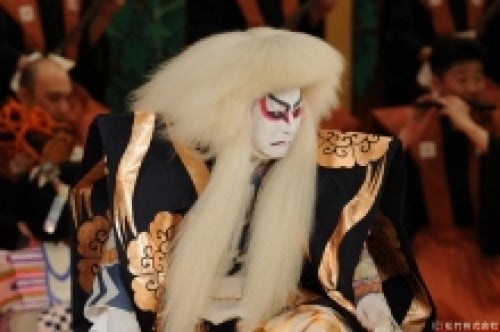 Published: Monday, November 10, 2014
Published: Monday, November 10, 2014
Events
Upcoming Events
November 13, 2014: Japan Futures Initiative and East Asian Studies will be co-sponsoring The Lion Dance in Kabuki Theatre, hosted by the Keiko and Charles Belair Centre, Renison University College, University of Waterloo. The event will take place on Thursday November 13, 2014 at 6:30pm in REN 0402. Guest lecture by Mr. Toshi Aoyagi, Program Officer of The Japan Foundation, Toronto. For more details, or to register for the event, please e-mail EAS@uwaterloo.ca.
Recent Events
October 22, 2014: JFI took part in Renison’s Annual General Meeting at Renison University College, University of Waterloo. The displayed information stood among East Asian Studies academic information, as well as two prominent sponsoring institutions, the Confucius Institute and SeJong Institute. Information displayed included events and publications by the JFI members, and was viewed by Renison Board members and guests of the event.
October 16-19, 2014: The Japan Studies Association of Canada(JSAC) annual conference, “Designing Japan: Innovation in a post-growth society” was held at the Ted Rogers School of Management, Ryerson University in Toronto, Ontario, Canada.
September 27, 2014: JFI took part in the 20th annual East Asian Festival at Renison University College, University of Waterloo. The display booth was visited by students, staff, faculty, and community members, and offered information on recent publications and events.
Publications
Forthcoming Publications
Kimie Hara eds., The San Francisco System and Its Legacies: Continuation, Transformation and Historical Reconciliation in the Asia-Pacific, Routledge, forthcoming (December 2014).
Tim F. Liao, Kimie Hara, and Krista Wiegand eds, China-Japan Border Disputes: Islands of Contention in Multidisciplinary Perspective, Ashgate, forthcoming 2015).
Recent Publications
「普通」の国日本 (Japan as a ‘Normal Country’?). Japanese language edition. Tokyo: Chikura Shobo, 2014 (edited, with Yoshihide Soeya and Masayuki Tadokoro).
Kimie Hara and Ken Coates eds., East Asia-Arctic Relations: Boundary, Security and International Politics, Centre for International Governance Innovation, 2014
Japan Watch
By: Seung Hyok Lee, PhD
Various media abroad have reported on “nationalistic comments” made by Japanese politicians under the current Prime Minister Abe. But as the latest commentary by Jeff Kingston points out, many Japan observers now express grave concern over the rise of right-wing extremist groups endangering Japanese society’s democratic principles.
We already know about some Japanese media – such as Asahi Shimbun – who are under pressure from such groups, and also from the general Japanese public for their previous coverage linked to the comfort women issue, since the reports are viewed by many Japanese as too self-critical and lacking sufficient evidence. These media outlets have been criticized as hurting Japan’s reputation, and they have been intimidated into toning down on their stance. But we are also witnessing the rise of “hate demonstrations” by the Anti-Korean Zaitokkai, and other groups’ intimidations toward academia. One case the commentary raises is the Hokusei Gakuen University deciding not to renew the contract for a part-time lecturer, for his controversial articles about the comfort women issue, following the university receiving threats of violence from right-wing groups. This is a sobering example of intimidation working.
Of course, we could try to understand this trend from Japan’s domestic perspective, where this may be a result of Japanese frustration and fatigue over their country’s relations with their neighbours; Japanese are simply tired of their efforts not being rewarded by their neighbours, and what we are observing is a surge of reaction in an aggressive form. From this perspective, it makes sense why many Japanese downplay genuine concern by outside observers, as another Korean or Chinese-motivated Japan bashing. And it gets trickier, as there is a point in the Japanese government claiming that it cannot simply ban a certain voice within the society. However, this “democratic principle” is clearly promoting - or at least acquiescing to - intolerance; as the commentary points out, it is under such circumstances that these right-wing cyber-activists ended up gaining “an outsize influence with the rise of Prime Minister Abe’s conservative government, which shares the goal of ending negative portrayal of Japan’s history.” And the larger society seems to be either acquiescing or scared to openly voice concern.
As Kingston admits, it might be an over-stretch to compare the current trend to Japan’s 1930s or label it as “21st-century McCarthyism.” And as Alexis Dudden argues, postwar Japan has become a respective country because of its ability to embrace an open and democratic atmosphere. But the current “tolerance for intolerance” in the name of freedom of speech only for a particular ideological strand, is certainly degrading to Japan’s dignity in the long-run. What is at stake, in the end, is the strength of genuine pluralistic democratic principle embraced by the Japanese society, and the voice of moderate majority Japanese who believe in this postwar ideal is now being tested.
David Welch keynote on, “How Dangerous are East Asia’s Territorial Disputes?”





